Overview of “Classical Myth” by Barry B. Powell (9th Edition)
Barry B. Powell’s Classical Myth (9th Edition) explores ancient myths through literary sources‚ analyzing their cultural and historical significance. Published by Oxford University Press‚ it offers a comprehensive narrative of classical mythology‚ enhanced by digital resources for modern education.
The 9th edition of Classical Myth by Barry B. Powell‚ published by Oxford University Press‚ offers a refreshed and comprehensive exploration of ancient myths. Released on July 31‚ 2020‚ this edition features 736 pages in paperback format (ISBN: 9780197527986). It includes enhanced digital learning resources‚ making it a valuable tool for both students and educators. Powell’s approach presents myths as narratives‚ analyzing their cultural and historical contexts‚ while the updated content ensures relevance for modern audiences.
Structure and Organization
The 9th edition of Classical Myth is meticulously structured to guide readers through the world of classical mythology. The text is divided into clear sections‚ each focusing on specific themes‚ authors‚ and mythological narratives. Powell begins with foundational myths‚ progressing to analyses of major authors like Homer and Vergil. The book’s organization ensures a logical flow‚ making it easy for students to follow and engage with the material effectively. This structure supports both academic study and independent reading.
Key Features of the 9th Edition
The 9th edition features enhanced digital resources‚ updated analyses‚ and expanded primary sources‚ providing a comprehensive and engaging exploration of classical mythology for students.
New Enhancements and Updates
The 9th edition of Classical Myth by Barry B. Powell introduces new translations of ancient texts‚ expanded commentary on key myths‚ and enhanced visual elements. It incorporates recent scholarly insights and updated interpretations‚ ensuring a fresh perspective for readers. The edition also features improved organization‚ making it easier for students to navigate and engage with the material. These updates reflect a commitment to providing a comprehensive and accessible understanding of classical mythology.
Digital and eTextbook Availability
The 9th edition of Classical Myth by Barry B. Powell is available in digital formats‚ including eTextbooks‚ offering flexibility for modern learners; Students can access the material through platforms like Ebookshopsolution.com and Library Genesis. The digital version includes enhanced features such as searchable text‚ interactive elements‚ and improved navigation‚ making it easier for students to study and reference key concepts. This digital accessibility ensures the text remains a valuable resource for both in-class and remote learning environments.
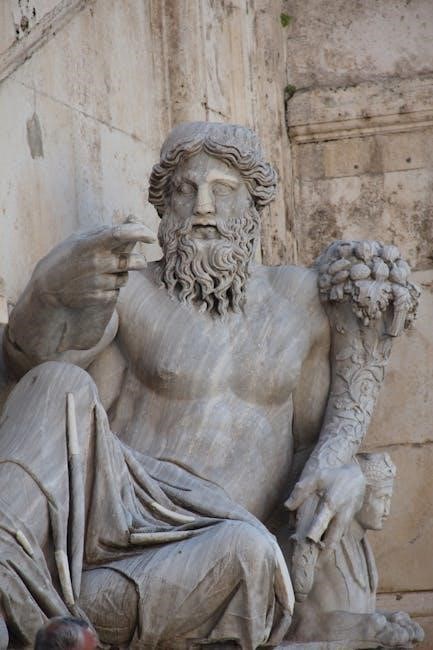
Historical Context of Classical Myths
Barry B. Powell’s Classical Myth (9th Edition) traces the origins and evolution of myths‚ reflecting ancient societies’ beliefs‚ values‚ and cultural transformations over time.
Origins and Evolution
Classical myths originated in ancient oral traditions‚ reflecting early societies’ beliefs and values. Over time‚ these stories evolved through literary adaptations‚ with authors like Homer and Vergil shaping their narrative forms. The 9th Edition of Barry B. Powell’s Classical Myth traces this transformation‚ exploring how myths were influenced by cultural shifts and historical contexts‚ ultimately becoming foundational to Western literature and thought.
Cultural and Historical Significance
Classical myths have profoundly shaped Western culture‚ influencing art‚ literature‚ and philosophy. Barry B. Powell’s 9th Edition highlights their enduring relevance‚ showing how these stories reflect the values and conflicts of ancient societies. By examining their historical context‚ the book demonstrates their role in forming cultural identity and ethical frameworks‚ making them essential for understanding the evolution of human thought and creativity.
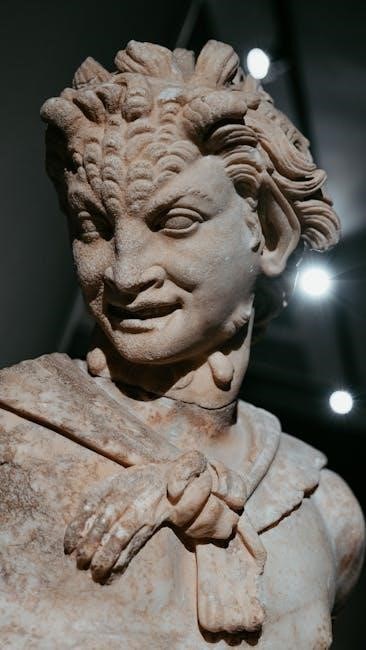
Major Authors and Their Contributions
Barry B. Powell’s 9th Edition emphasizes the roles of Homer and Vergil‚ whose works laid the foundation for classical mythology. Their narratives shaped the cultural legacy of ancient myths.
Role of Homer and Vergil
Homer and Vergil are central to classical mythology‚ as their works‚ such as the Iliad‚ Odyssey‚ and Aeneid‚ shaped the narrative foundation of ancient myths. Homer’s epics introduced iconic heroes and divine conflicts‚ while Vergil’s Aeneid bridged Greek and Roman mythological traditions. Their writings not only preserved myths but also influenced their interpretation and cultural significance‚ making them indispensable sources for understanding classical mythology‚ as emphasized in Barry B. Powell’s 9th Edition.
Other Significant Authors
Beyond Homer and Vergil‚ authors like Ovid‚ Apollonius of Rhodes‚ and Hesiod play pivotal roles in shaping classical mythology. Ovid’s Metamorphoses offers a vast compilation of myths‚ while Apollonius’s Argonautica explores heroic quests. Hesiod’s Theogony provides insights into the origins of the gods. These authors‚ along with others‚ contribute to the rich tapestry of classical mythology‚ influencing art‚ literature‚ and cultural understanding‚ as discussed in Powell’s 9th Edition.
Themes and Motifs in Classical Myths
Classical myths explore themes like heroism‚ fate‚ and human nature‚ with motifs such as quests‚ transformations‚ and divine intervention‚ reflecting deeper societal and moral dilemmas.
Common Themes
Classical myths explore universal themes such as heroism‚ fate‚ and the struggle between mortals and gods. They often depict human nature‚ morality‚ and the consequences of hubris. Love‚ revenge‚ and transformation are recurring elements‚ offering insights into ancient societal values. These narratives serve as moral frameworks‚ addressing existential questions and the human condition‚ while reflecting cultural and historical contexts. Powell’s analysis highlights how these themes transcend time‚ remaining relevant in modern discourse and art. His approach bridges ancient stories with contemporary understanding‚ enriching the study of classical mythology.
Recurring Motifs
Recurring motifs in classical myths include the hero’s journey‚ quests‚ and divine intervention. Transformations‚ both physical and metaphorical‚ are common‚ symbolizing change and human frailty. Battles between monsters and heroes highlight courage and destiny. Love‚ revenge‚ and betrayal frequently drive narratives‚ exploring human emotions and moral dilemmas. These motifs‚ analyzed by Powell‚ reveal universal patterns in storytelling‚ reflecting ancient beliefs and continuing to resonate in modern interpretations of classical mythology.

Cultural Impact of Classical Myths
Classical myths have profoundly influenced art‚ literature‚ and culture‚ shaping themes and motifs that endure in modern storytelling and intellectual discourse.
Influence on Art and Literature
Classical myths have deeply shaped themes and motifs in art and literature‚ influencing works from ancient epics to modern novels. Authors like Homer and Vergil drew inspiration from these stories‚ embedding moral and symbolic truths. Contemporary literature often revisits mythological narratives‚ reflecting their timeless appeal. The 9th edition by Barry B. Powell highlights how these myths continue to inspire creativity‚ offering insights into their enduring relevance in cultural expression.
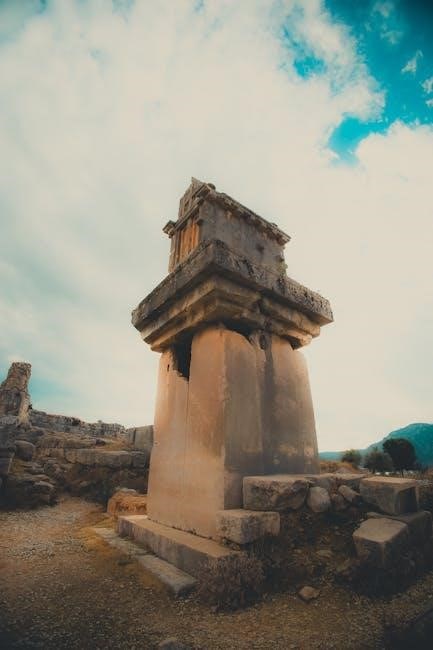
Modern Relevance
Classical myths remain relevant today‚ offering insights into universal human experiences. Themes like heroism‚ morality‚ and fate resonate across cultures and time. Barry B. Powell’s 9th edition explores how these stories inspire contemporary art‚ literature‚ and film. Digital resources enhance accessibility‚ making ancient myths accessible to modern learners. The book’s updated content ensures that classical mythology continues to engage students in understanding its lasting impact on global culture and thought.
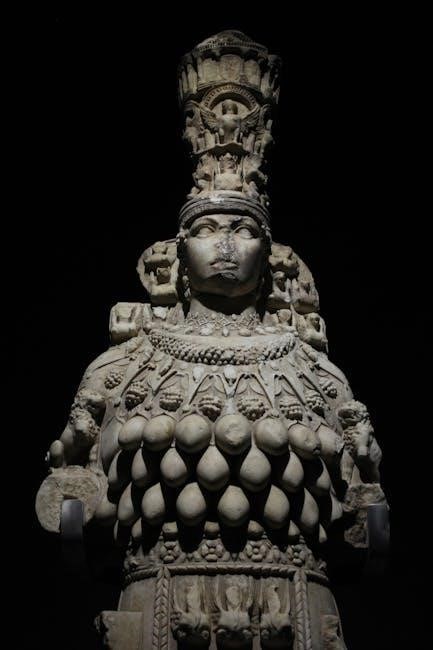
Digital Learning Resources
The 9th edition of Classical Myth by Barry B. Powell is available as an eTextbook‚ offering enhanced digital features. Supplementary materials include online resources like interactive timelines‚ quizzes‚ and multimedia content‚ designed to enrich learning experiences for students and educators alike.
Supplementary Materials
The 9th edition of Classical Myth by Barry B. Powell is accompanied by an array of digital supplementary materials. These include interactive timelines‚ multimedia content‚ and online quizzes designed to enhance student engagement. Educators benefit from instructor resources and lecture slides‚ while students can access study guides and primary source excerpts. The eTextbook version integrates these tools seamlessly‚ providing a comprehensive and interactive learning experience that complements the core text effectively.
Benefits for Students and Educators
The 9th edition of Classical Myth by Barry B. Powell offers significant benefits for both students and educators. Students gain access to interactive digital resources‚ including timelines‚ quizzes‚ and multimedia content‚ which enhance understanding and engagement. Educators benefit from customizable materials‚ such as lecture slides and assignable questions‚ that streamline lesson planning. The integration of these tools fosters a dynamic and flexible learning environment‚ catering to diverse teaching and learning styles while promoting deeper exploration of classical mythology.
Reception and Reviews
The 9th edition of Classical Myth has received widespread acclaim for its clarity and updated resources‚ praised by both academics and students as a significant improvement over previous versions.
Academic and Student Feedback
Scholars and students have praised the 9th edition of Classical Myth for its clarity and engaging narrative. Educators appreciate the updated resources and digital enhancements‚ which improve teaching and learning experiences. Students commend the book’s accessibility and depth‚ making complex myths understandable. The inclusion of visual aids and online materials has been particularly well-received‚ enhancing comprehension and fostering engagement with classical mythology.
Comparison with Previous Editions
The 9th edition of Classical Myth by Barry B. Powell introduces significant enhancements‚ including updated translations and expanded digital resources. Compared to earlier editions‚ it offers improved readability and a more engaging narrative style. New visual aids and online materials complement the text‚ making it more accessible for modern students. While retaining the core content of previous versions‚ the 9th edition refines and expands upon its predecessors‚ ensuring a fresh and enriched learning experience for both educators and students.

Barry B. Powell’s Classical Myth (9th Edition) offers a comprehensive exploration of ancient myths‚ enhanced by digital resources and available as a PDF for modern accessibility.
Final Thoughts
Barry B. Powell’s Classical Myth (9th Edition) remains a cornerstone in the study of ancient myths‚ offering a rich exploration of classical mythology. Its comprehensive analysis of myths from Homer to Vergil‚ combined with updated digital resources‚ makes it an essential tool for both students and educators. The availability of the text in PDF format ensures accessibility‚ while its academic rigor maintains its relevance in modern scholarship.
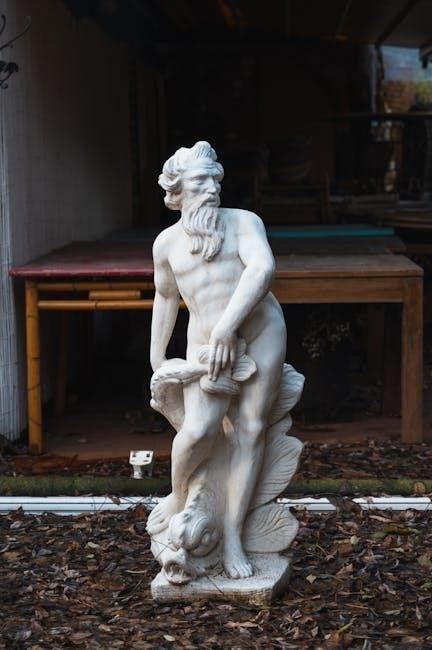
No Responses